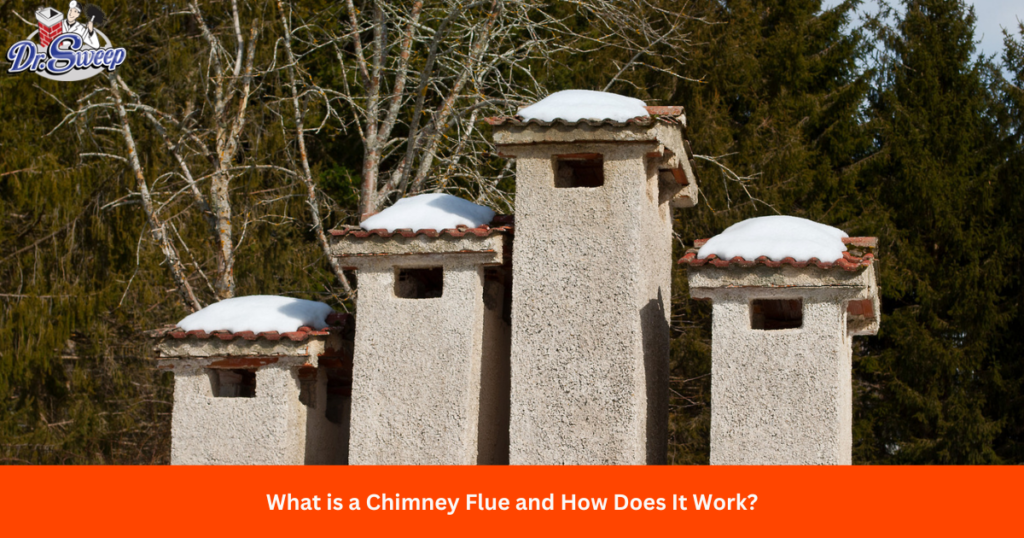A chimney flue is a vital part of your chimney system, yet it’s often overlooked by homeowners. Understanding the role of the chimney flue and how it functions can improve the safety and efficiency of your home. This article will explore what a chimney flue is, how it works, and why regular maintenance, like a chimney inspection or cleaning by a professional chimney sweep, is critical for your home’s safety.

What is a Chimney Flue?
A chimney flue is the vertical passage inside the chimney that allows smoke, gases, and other combustion byproducts to safely exit the house. Whether you’re using a fireplace, stove, or furnace, the flue is responsible for directing these hazardous materials up and out of your home. It also plays a key role in maintaining proper airflow for the fire, ensuring it burns efficiently. Most chimney flues are lined with a material such as flue tile, stainless steel, or cast-in-place cement. These liners help protect the interior of the chimney from extreme heat, prevent flammable creosote buildup, and reduce the risk of chimney fires.
How Does a Chimney Flue Work?
The chimney flue operates based on the principle of convection. When you light a fire, the heat causes the air inside the flue to rise. As hot air and gases move upward, cooler air from outside is drawn into the bottom of the chimney, feeding the fire with oxygen. This upward draft, called the “chimney effect,” ensures smoke and dangerous gases are safely carried out of your home. However, for this system to work efficiently, the chimney flue needs to be the correct size. A flue that is too small can restrict airflow, causing smoke to back up into the house. On the other hand, a flue that is too large may not create enough draft, leading to poor combustion and excessive creosote buildup.
Importance of Regular Chimney Inspections
A chimney flue may seem simple, but it requires regular maintenance to keep it functioning properly. One of the most important aspects of chimney maintenance is scheduling a chimney inspection. A professional chimney sweep will assess the condition of your chimney flue, looking for signs of damage or wear, such as cracked or broken flue tiles, blockages, or creosote buildup. Creosote, a highly flammable byproduct of burning wood, can accumulate in the chimney flue over time. This substance can ignite, leading to dangerous chimney fires. An inspection can identify creosote buildup and other potential hazards before they become serious problems.
Common Chimney Flue Issues
Creosote Buildup
As mentioned earlier, creosote buildup is a common issue in chimney flues. This tar-like substance forms when wood is burned and sticks to the inside of the flue. Regular cleaning by a chimney sweep is necessary to prevent it from reaching dangerous levels.
Cracked or Damaged Flue Tiles
In chimneys lined with flue tiles, cracks or damage can occur over time due to high heat and age. Damaged tiles expose the masonry of the chimney to excessive heat, increasing the risk of a house fire. A chimney inspection will identify these problems so they can be addressed before they worsen.
Blockages
Leaves, twigs, and even animals can cause blockages in the chimney flue. These obstructions can prevent smoke and gases from escaping, leading to a buildup of dangerous carbon monoxide inside your home. Installing a chimney cap can help prevent blockages, but regular inspections are still essential to ensure the flue remains clear.
Improper Flue Sizing
An improperly sized chimney flue can lead to inefficient burning, poor draft, and increased creosote buildup. If you have recently installed a new fireplace or stove, it’s important to have the flue inspected to ensure it’s the correct size for the appliance.
The Role of the Chimney Sweep in Flue Maintenance
A chimney sweep plays a crucial role in maintaining the health of your chimney flue. During a sweep, the chimney is thoroughly cleaned to remove soot, creosote, and any other obstructions. In addition, a chimney inspection is often performed to check the overall condition of the flue, ensuring there are no cracks, blockages, or structural damage.
How to Protect and Extend the Life of Your Chimney Flue
While regular chimney inspections and cleanings are essential, there are other steps you can take to protect your chimney flue and ensure it lasts as long as possible.
- Use Seasoned Firewood
Burning wet or unseasoned wood produces more creosote than dry, seasoned firewood. Always use properly dried wood in your fireplace to reduce creosote buildup in the flue. - Install a Chimney Cap
A chimney cap prevents rain, debris, and animals from entering your chimney flue. This not only protects the flue from damage but also reduces the likelihood of blockages. - Schedule Annual Chimney Inspections
Even if you don’t use your fireplace frequently, it’s important to schedule an annual chimney inspection. A professional can identify potential issues with the flue, chimney liner, or other parts of the system before they become serious problems. - Clean the Chimney Regularly
Regular cleanings by a professional chimney sweep are essential for preventing creosote buildup and ensuring your chimney flue remains clear of obstructions. The National Fire Protection Association (NFPA) recommends cleaning the chimney at least once a year or more often if you use it frequently.
Expert Chimney Sweep Services for Warren Homeowners by Dr Sweep
Understanding the function of a chimney flue is crucial for maintaining the safety and efficiency of your home. From ensuring proper airflow to preventing dangerous creosote buildup, your chimney flue plays a key role in keeping your home safe from fires and harmful gases. Regular chimney inspections and cleanings are essential to identifying and addressing issues before they escalate. Additionally, taking preventive measures, such as using seasoned firewood and installing a chimney cap, can help protect and extend the life of your flue. If you’re due for a chimney inspection or cleaning, we’re here to help. At Dr Sweep, we specialize in thorough chimney inspections and professional sweep services to keep your chimney flue in top shape. We serve homeowners in Warren, MI, and the surrounding areas, ensuring your chimney operates safely and efficiently. . Send a message or give us a call today to schedule your appointment and let us help you maintain a safe and healthy home!
Dr Sweep
24800 Warner Ave suite 103, Warren, MI 48091
(248) 639-4897



